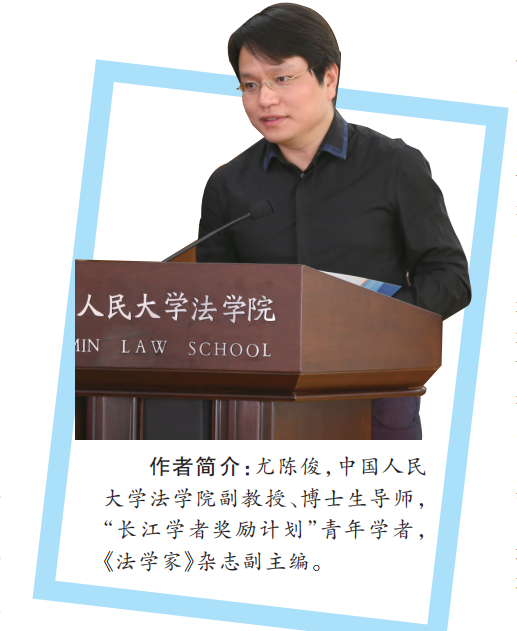"Law Scholars" magazine deputy editor -in -chief You Chenjun: The writing of law papers must have the relationship between "topic consciousness" and "problem awareness" and "topic consciousness"
Author:Democratic and Legal Times Time:2022.07.07


Special writing | You Chenjun
Responsible editor | Xue Yingjun
There are 2257 words in the text, and it is expected to read 7 minutes
In recent years, the law schools of colleges and universities have increasingly attached great importance to the cultivation of students 'thesis writing ability. Some have also specially set up such courses. Although everyone’s specific forms of lessons are not consistent, many teachers will emphasize that when guiding students' writing, they will emphasize that there must be there. "Problem consciousness".
What is "problem consciousness"? What are the misunderstandings of the "problem consciousness"? How to cultivate a true "problem consciousness"? Based on related teaching experience and scientific research experience, the author talks about specific views.
"Confusion" of "Problem Consciousness"
Beginning in the fall semester of 2017, the author offers a jurisprudence writing course for undergraduate students of the Law School of Renmin University of China. So far, five rounds of lectures have been completed. When the course was initially opened, the author will specifically tell the "problem consciousness" in the writing of law papers, and publish himself in the "" Problem Consciousness "on the 5th issue of" Exploration and Contention "in the" Exploration and Contention "magazine -from "The lack of propositions in the writing of law papers" is provided to students to read. However, from the "class thesis" received at each time the first two years of teaching, many students written in curriculum thesis still lack a clear "problem awareness". Where is the crux of the problem? I found many students' conversations and found that for undergraduates, the "problem consciousness" was very confusing.
The author's research and development shows that many undergraduates believe that the writing of academic papers must have a "problem consciousness", which refers to finding a specific problem in the sense of research objects, and is solved by analysis. This kind of deviation comes from the real "problem" misunderstanding in what awareness of the "problem". Many teachers and students of the law school are now familiar with the "problem consciousness", which is not unique to illegal disciplines, and all disciplines in modern social sciences have emphasized.
The "problem consciousness" mentioned in modern social science research can be expressed in the corresponding English expressions: Question, Privem, and ISSUE, but these three English words can be translated into "problems" in Chinese. This It is easy to cause confusion and misunderstanding when emphasizing "problem consciousness" in the Chinese academic context.
What is the real "problem consciousness"? Mr. Liu Nanping's "Bone Marrow" and "Skin Po" in the first issue of "Chinese and Foreign Law" in the first issue of "Chinese and Foreign Law" -The Discussion on the Disability of Chinese Law Studies "believes that the most important thing for an academic paper is that the most important thing is that There is a "proposition" with academic originality. The "proposition" mentioned here is the corresponding English expression is TheSIS or Issue. His explanation of what "proposition" is: "proposition" specifically refers to "a general problem or basic point that you try to discuss or demonstrate in the paper; "Central proposition", that is, the "problem consciousness" often said in the legal community. Therefore, in the writing of law academic papers, the "problem" in the real "problem consciousness" refers to the ISSUE in English, not Question or Privem. In order to avoid confusion of the three, the author translates Question in the specific context of law papers as "problem", translated proplem as "topic", and translated Issue as "topic" or "proposition".
Questions, topics and topics
Regarding the relationship between issues, topics and topics (or propositions), the author said in the article "Awareness of the Problem of Law Research" published by the "People's Daily" published on July 15, 2019, " The awareness of the problem should be established in the distinction and grasp of the three concepts of problems, topics and propositions, and shows the practical character of jurisprudence in accordance with academic laws. Specifically, it is to incorporate a certain legal issue or legal phenomenon in reality into legal phenomena into legal science Understand the academic context, summarize legal issues or phenomena into an academic topic, and then propose new academic propositions on this topic and use academic languages to increase the total amount of knowledge and theoretical content. " But many young students may not be able to truly realize this, so that they often understand the writing academic papers as a "problem" or "topic" in the sense of a question. The thesis "the topic" or "proposition" in the lack of the Issue sense, that is, "there is" the "on the domain 'but no' topic '". The "papers" with such common problems are often introduced, sorted out, and described by the knowledge points related to a legal system or legal phenomenon, not to demonstrate the central "topic". In other words, this kind of law papers only select a clear research object or delineate a general research field, and conduct a "comprehensive" introduction and explanation, but lacks the central "proposition".
In fact, the papers of "on the domain" without 'topics "not only exist in the course papers written by many undergraduates, but also more common in the manuscripts received by the French Journal. Therefore, in recent years, when teaching and discussing the writing skills of law papers, the author is more inclined to use the expression of "topic awareness". There are three main reasons.
First of all, emphasize that the writing of law papers must have "the topic consciousness", which can avoid the importance of "problems" or "topics" as a research object or research field when introducing the value of "papers". What is the academic new meaning of the subject. In fact, the importance of a "problem" or "topic" as a research object or research field does not mean that all research on the "problem" or "topic" is very important. For example, artificial intelligence applications have brought great changes to our current life, so some people think that the use of artificial intelligence in judicially is an important legal topic. But does this mean that every article discussed artificial intelligence judicial use is bound to be academic? Actually, not. Secondly, emphasizing that the writing of law papers must have a "topic awareness", which can allow people to focus on how to refine how to refine the new "topic" when writing papers, and then promote academic innovation. Some people simply understand the "problem consciousness" as a clear understanding of a clear problem as a research object or research field. The "papers" written by the results have become the "textbook -style law" papers. Therefore, we must consciously develop the "topic awareness", focus on how to form a new topic that runs through the full text, and pay attention to the demonstration during the writing process.
Finally, emphasizing that the writing of law papers must have a "topic awareness", which can promote academic dialogue and promote and form accumulated academic development. This is because if you want to propose a "topic" that really have academic new ideas, you must first comprehensively understand and objectively summarize the representative research results of the previous issues or topics. Under normal circumstances, in the process of comparing consciously with their predecessors, the author can make self -judgment more accurate and objectively in terms of the innovation of the paper, and then writing the paper is more likely to win the recognition and recognition and recognition of academic circles and affim. This kind of work that comprehensively sort out the results of the previous "topics" and give objective evaluation before putting forward the new "topic" is also the process of conducting academic dialogue and view collision between researchers. On the basis of previous research, the "topic" that really has the meaning of academic incremental significance is also easier to make the dissertation.
In
- END -
Create a teaching and research team that can fight hard battles
□ Ren YingbinThere are more than 100 schools in Fenyang City, showing the characteristics of many clothing points, many classifications, and large urban and rural education gaps. Even if many teachin...
The president of the Three Gorges University led a team to Dangyang to carry out enrollment propaganda and visit the enterprise expansion work

On June 29, Wang Yanting, president of the Three Gorges University, led a team to ...